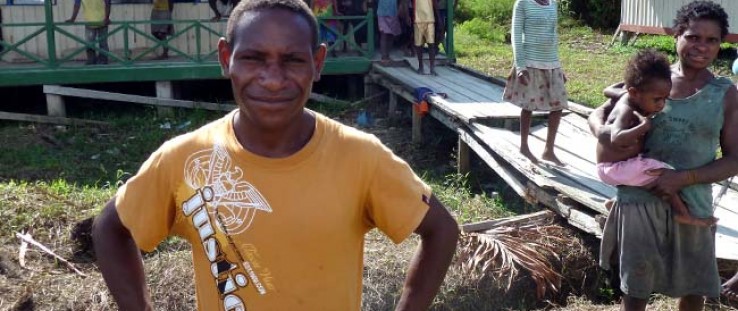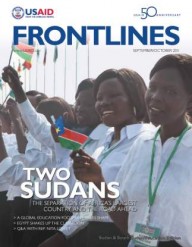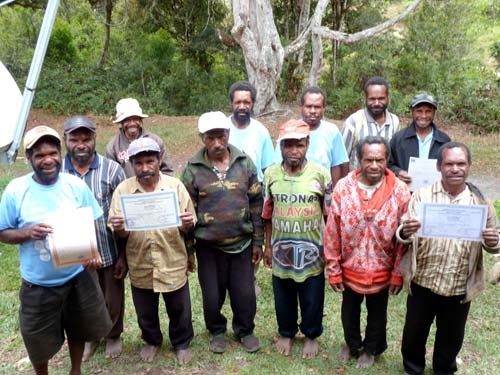 A volunteer teacher in front of the recently built Kokamu Parallel School in Dekai, Yahukimo District, Papua.
Naomi Sosa
A volunteer teacher in front of the recently built Kokamu Parallel School in Dekai, Yahukimo District, Papua.
Naomi Sosa
 A volunteer teacher in front of the recently built Kokamu Parallel School in Dekai, Yahukimo District, Papua.
Naomi Sosa
A volunteer teacher in front of the recently built Kokamu Parallel School in Dekai, Yahukimo District, Papua.
Naomi Sosa
In the highlands of Papua, Indonesia’s largest and most undeveloped region, there are not enough schools, and those that do exist do not function well. As Ako Kobak, a non-formal primary teacher in Sologma, says: “We are [a] 12-hour walk from the nearest government school and, even there, the teachers don’t come.”
Because it is so remote, school district officials say managing staff and services at the school is challenging, to say the least. Many children are forced to migrate to towns for their education and are separated from their families. This means fewer girls can access education, as cultural concerns and safety issues impede their mobility. And, teachers and health workers are often absent from their assigned posts as most live and receive their salaries in the towns—which can be a several-day walk, or even a plane ride away.
Blessed with abundant natural resources, this vast region is critically important to Indonesia’s development and success—politically, socially, environmentally, and economically. And having an educated Papua citizenry on par with the rest of the nation—–the administrative provinces of Papua and West Papua have the lowest literacy rates and primary-school completion rates in Indonesia—is critical to making those four levers work effectively.
“As such, the Government of Indonesia recognizes that a special approach to education is needed in such a complex environment,” says Pak James Moudow, head of the Papua province education office.
This year, the USAID mission in Indonesia began a two-year pilot project to help the government improve the educational environment in Papua. The two-fold aims: build government capacity in management and governance of education services; and support local, community-based organizations that already deliver education services to indigenous populations in the remote areas where services are often absent.
Linkages and Parallels
Underlying this approach is a concerted effort to improve the linkages between government and civil society. “Decentralization in Indonesia has made the role of civil society critical: civil society knows and understands the needs of local communities, and can advocate for budgets to support priorities—whether schools, health posts, or other services,” says Miles Toder, acting USAID mission director.
Under the formal education component, USAID is working in tandem with UNICEF to increase the Papuan Government’s ability to manage services in critical areas such as planning and budgeting, financial analysis, and teacher personnel management. The efforts will complement an education governance and management program funded by AUSAID, Australia’s equivalent to USAID.
Recognizing that teacher absenteeism stunts learning, USAID is also collaborating with UNICEF and two local universities on a teacher absenteeism study. Study backers hope the results, along with other similar studies at the national level, will lead to solutions that can be applied at district, provincial, and national levels.
On the non-formal side, USAID is providing small grants to local organizations that show promise and innovation in expanding access to education and health services for indigenous Papuans in hard-to-reach places. To date, non-formal education has consisted of basic literacy and skills courses in community centers.
“When we sent out assessment teams to Papua, one clear conclusion was the close connection and impact of one sector on another. Without good health care, students are not able to perform in schools, and adults are unable to focus on income generation. Without education, opportunities for employment are limited, and basic life skills neglected. Without democratic decision making, portions of society are marginalized and neglected—leading to potential conflict. All of these elements are interconnected. We need to work on all of them,” says Toder.
USAID’s first grantee, Yasumat, is a local Papuan NGO rooted in the community. It trains local villagers who have at least a junior-secondary school level of education to teach fundamental literacy, numeracy, and life skills in their own village communities through non-formal “parallel” schools.
Yasumat’s one-room parallel schools are fully supported by passionate volunteer teachers who are providing a basic education, roughly grades one through three, for approximately 8,000 children.
According to Kobak, “If we didn’t have parallel schools, we wouldn’t be able to learn. Yasumat training helps us to teach the people better, and we are constantly improving.”
The nearest government school to Sologma Parallel School, where Kobak teaches, is about a three-hour walk. If that wasn’t bad enough, children also have to cross a decrepit bridge spanning a major river to access it.
“There [are] a lot of parallel teachers . . . . We haven’t been properly educated like government teachers, but through the parallel school program and training, we are learning to be better teachers and we are the ones who are in the villages teaching the people how to read and write,” says Modes Kobak from the Bonahaik parallel school.
“We recognize it is unrealistic to expect highly trained teachers to make long journeys to remote areas and remain there for long. Therefore, it’s vital to work within local communities, to develop local villagers’ skills, and provide them with resources and tools as teachers so that rural and remote village children in Papua can also achieve a basic level of literacy, numeracy, and life skills without having to leave their home villages,” says Chimi Thonden, USAID senior education specialist.
With USAID support, Yasumat will expand development of materials and training for parallel schools that incorporate information on nutrition, sex education, and basic hygiene—critical in an area that has the highest rates of HIV in Indonesia and some of the poorest public health statistics.
USAID expects that parallel schools and quality primary schools in remote areas will improve access to education, especially for girls, and provide them with increased opportunities to obtain a secondary education. No less important, these activities will allow Papuan families to remain together in their home villages, rather than forcing them to migrate to the cities for education.
“The challenges in working in underserved regions like Papua are great, but through innovative programming and synergies among technical and support offices, USAID is better poised to help the people who need it the most,” says Toder.










Comment
Make a general inquiry or suggest an improvement.